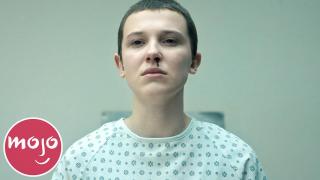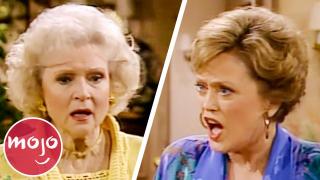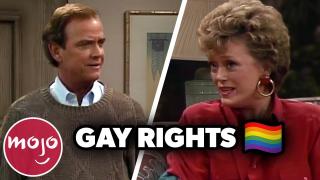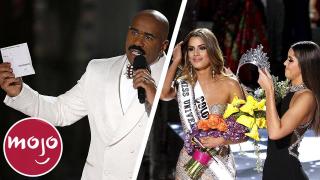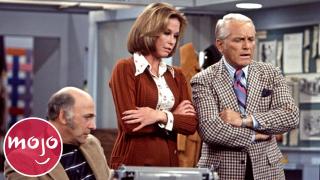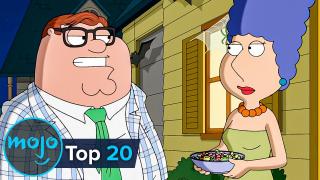Top 10 '70s Shows That Properly Handled Serious Topics
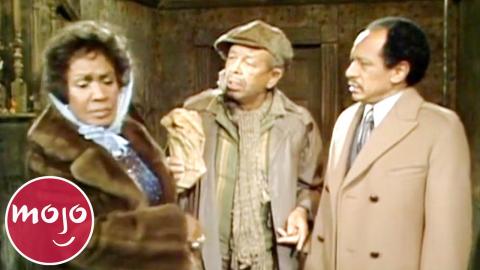
#10: “Good Times” (1974-79)
Top 10 TV Shows That Were So Good They Launched Careers
“Good Times” came from the Norman Lear family tree of television spin-offs. This was a heritage rooted in great writing that was often unafraid to go to some dark places. Specifically, many fans of “Good Times” will recall how matriarch Florida Evans had to deal with the death of her husband. The episode “The Big Move: Part 2” showcases how a grief-stricken Florida is processing the loss, but this wasn’t the only time this show handled serious topics. The season two premiere “Florida Flips” displays how a stressed-out Florida seeks a women’s support group in order to deal with her mental health. “Good Times” is well remembered by TV fans today for the charm and nuance of characters like Florida, and these episodes still hold up today.
#9: “Police Story” (1973-87)
The 1970s were in no shortage of quality television cops or procedurals. “Police Story” was something different, however, having been created by an actual former police officer, Joseph Wambaugh. Wambaugh’s work can be seen within all kinds of excellent screenplays and teleplays of the decade, but “Police Story” brought realistic detective work to the small screen. The anthology format of “Police Story” allowed for new characters, stories and topics to be discussed week-to-week. These included instances of police brutality and racism, as well as more personal stories that come from the perspective of someone who walked the beat. “Police Story” didn’t have to rely on outlandish, gimmicky characters; it instead hung its creative hat on quality, compelling storytelling.
#8: “Little House on the Prairie” (1974-83)
Top 10 '80s Shows That Properly Handled Serious Topics
“Little House on the Prairie” may, at first glance, seem like a wholesome, family show. And it is that. However, this small screen adaptation of Laura Ingalls Wilder’s series of novels also wasn’t afraid to get downright dark. Episodes such as “I’ll Be Waving As You Drive Away” earned “Little House” an Emmy nomination. It dealt with Melissa Sue Anderson’s character going blind, as a result of scarlet fever. Elsewhere, the episode “Sylvia” explored the darkest depths of sexual assault and victim blaming. Through it all, however, “Little House on the Prairie” remained compelling television with a consistent narrative that kept audiences coming back.
#7: “The Jeffersons” (1975-85)
Top 10 Old TV Shows That Properly Handled Serious Topics
The character of George Jefferson is beloved by fans today, primarily for his bluster and incorrigibly brash attitude. However, “The Jeffersons” also made sure to showcase their characters as multifaceted, such as in the Christmas episode where George visits his childhood apartment. The episode starts out with a typical sitcom misunderstanding, where Louise is suspicious of why George is sending money to an unknown Harlem address. We then find out that he’s acting as a secret benefactor for the family that’s living there now, in an attempt to right the wrongs of his own, troubled childhood. Elsewhere, “The Jeffersons” also tackled topics like racism and the KKK with the episode, “Sorry, Wrong Meeting.” And it did so with a steady, comedic hand.
#6: “ABC Afterschool Special” (1972-97)
Top 10 TV Shows with Great Special Effects
The “ABC Afterschool Special” was more than just a ‘70s show; it was an institution that ran for twenty-five years. This was the sort of anthology that attempted to discuss serious topics with kids and teenagers, without talking down to them. Granted, each “Afterschool Special” was different, and could often vary wildly in tone, but there are a number of episodes that remain compelling for all ages. For every (lovingly cheesy) ‘80s episode like “The Day My Kid Went Punk,” there’s one like “Which Mother is Mine?” that deals with the rights of birth parents versus adoptive guardians. This Daytime Emmy-winning series always intended to inform, educate and entertain, and it achieved those aims in big ways.
#5: “M*A*S*H” (1972-83)
Top 10 Mistakes Caught Live at Award Shows
There are few programs out there, from the ‘70s or any decade, that better embody the word “dramedy” than “M*A*S*H.” It’s one of the most popular shows of all time, and it’s easy to see why. It’s been well documented how the series finale titled “Goodbye, Farewell and Amen,” dealt with some serious issues, like wartime PTSD. However, the show was always well-equipped to balance the comedic beats with the realistic horrors of having a plot set during the Korean War. Take, for example, the episode when the airplane that’s taking Lt. Colonel Henry Blake back home is shot down, leaving no survivors? Or the serious questions raised about ethics and partisan politics in the military? “M*A*S*H” could, quite simply, do it all.
#4: “Barney Miller” (1975-82)
Top 10 Barney Stinson Rules To Live By
It doesn’t seem unfair to say that “Barney Miller'' walked in the 1970s, so shows like “Brooklyn Nine-Nine” could run in the modern day. This was a sitcom that rarely left the squad room, but it didn’t really need to. “Barney Miller'' surrounded itself with memorable characters from a diverse set of cultural backgrounds, and it also didn’t shy away from the less glamorous side of police work. This was a show more likely to show routine paperwork than an exciting shootout, yet “Barney Miller”' also dove headfirst into the aftermath of when such a shootout occurs. It’s tragic, and it’s those left alive, such as Sergeant Chano, who must deal with the repercussions of their actions.
#3: “The Mary Tyler Moore Show” (1970-77)
Top 10 Times The Mary Tyler Moore Show Tackled Serious Issues
“The Mary Tyler Moore Show” was an absolute game changer when it debuted back in the 1970s. The show was proud to be a forerunner with regards to women’s liberation, and broke down so many barriers throughout its run. Mary Richards was a single, career-driven woman during an age when many female characters on sitcoms were relegated to “wife” or “mother” stereotypes. Instead, “The Mary Tyler Moore Show” discussed the wage gap, marital infidelity, body image issues and more, yet never came across as preachy or self-righteous. Instead, these were episodes lauded for their creative writing, and inventive storylines. The awards speak for themselves: “The Mary Tyler Moore Show'' is an absolute classic.
#2: “Maude” (1972-78)
The YouTube channel titled The Norman Lear Effect is dedicated to archiving the permeative influence of the producer’s groundbreaking sitcoms. “Maude” just has to be one of Lear’s finest achievements, however, and that’s saying something. Bea Arthur was just a force of nature as the titular character, who was spun-off from Lear’s “All in the Family.” Maude Findlay’s outspoken views on politics and social issues are matched only by the character’s comedic timing. Meanwhile, the show also dealt with the occasional disillusionment and even unintentional prejudices that can come along with such activism. Additionally, hot button topics like reproductive rights weren’t shied away from, but rather tackled head-on with a generational sense of gravitas. Before we reveal our number one pick, here are some honorable mentions! “Taxi” (1978-83) Existentialism, Melancholy & Great Laughs “Laverne & Shirley” (1976-83) Laverne’s Love & Loss “WKRP in Cincinnati” (1978-82) A Concert Tragedy “Lou Grant” (1977-82) A “Mary Tyler Moore Show” Spin-Off Swings for the Fences
#1: “All in the Family” (1971-79)
Top 20 Times Family Guy Made Fun of The Simpsons
Ask any television viewer of a certain age what they know to be the most well-known series to tackle serious social commentary, and you’ll probably find one consistent answer across the board: “All in the Family.” Granted, the sequel-series “Archie Bunker’s Place” also had some amazing moments, but the OG show was something that felt once-in-a-lifetime. “All in the Family” was a perfect storm of casting, storylines, performances and writing that turned an adaptation of a U.K. series into an absolute American classic. It’s probably easier to reference “All in the Family” episodes that didn’t court controversy, rather than the other way around, because pushing buttons was this show’s bread-and-butter. The war in Vietnam, racism, public assistance, family trauma…The Bunker Family covered it all.


